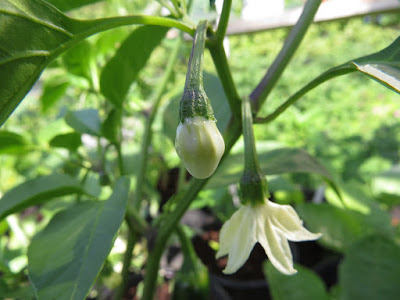Chilli and sweet pepper plants can and do self-pollinate, but if you are growing more than one variety and want to save seeds from individual varieties then problems will arise. Most chilli peppers can cross pollinate with other chilli varieties, they can also cross with sweet peppers and vice versa, leading to all sorts of possibilities in future generations. Bees and other insects are well skilled in moving pollen around available plants and flowers and in doing so they'll also be making a very good job of cross pollinating varieties!
So if you are interested in saving chilli seeds and want to keep individual varieties pure, some form of barrier is needed. Methods you can try are; making an isolation cage, using fine mesh bags tied over flowers, growing an individual plant as a house plant. But another way is to use pva glue to seal the flower buds closed and ensure no stray pollen gets in to cross pollinate. I think the gluing method is a nice and simple way to achieve seed purity with not much effort. Especially good if you are growing several plus varieties with limited growing space.
Needed;
Flowering chilli plants
Pva glue in a tube or a bottle with a nozzle. Alternatively a small amount can be poured into a suitable container for dipping the flower into. A plastic cap from a fizzy drinks bottle works well.
Old cloth or kitchen paper towel, it can get a bit sticky!
Coloured thread or similar to identify the ‘glued’ self-pollinated flowers/fruits. It's amazing how difficult the glued flowers become to spot.
First select suitable flower candidates. In the picture below the lower big fat plump flower looks just ready to burst its petals open, whereas the slightly smaller flower above looks like it will be a couple of days before opening and needs a little longer to develop.
Again here's a nice fat bud at just the right stage.
Next for the glue, I'm starting with a little dab in several places on the flower before spreading them out to cover all the petals, but I'm sure there are several good ways to apply a good coat?
And here I'm starting to spread the glue on this bud
Here you cans see the flower buds with their newly applied pva coat, still wet.
You can see start to see the petals below as the glue dries to a dull see through coat. I've applied two coats of glue to make sure there is a good covering, if it is too thin the buds will burst the glue and be able to open.
It's good to have a little extra glue at the bottom of the petals, it helps to add strength.
Five days later the bud is at it's maximum size pushing against the glue, but the petals remain closed. The glue coat appears to be good for catching greenfly too!
And again another flower sealed shut, looks like there is a fruit starting to swell underneath.
In another three days, the flowers are fading and the chilli fruit forming is already splitting the glue coated flower and pushing it off. The red thread has been applied to the selfed fruits in order to identify them later on and avoid eating them by accident. It is best to mark them before or as you mark them, glued buds can be hard to spot as the glue dries clear.
With this smaller flowered variety I tried applying glue with my finger, it works but a bit messy both for me and the plant.
I'm happy with these, the flowers have a good glue coating
Here's one of the glued flowers mature now and starting to fade, it looks just about ready to start splitting and being pushed off by the swelling fruit inside.














